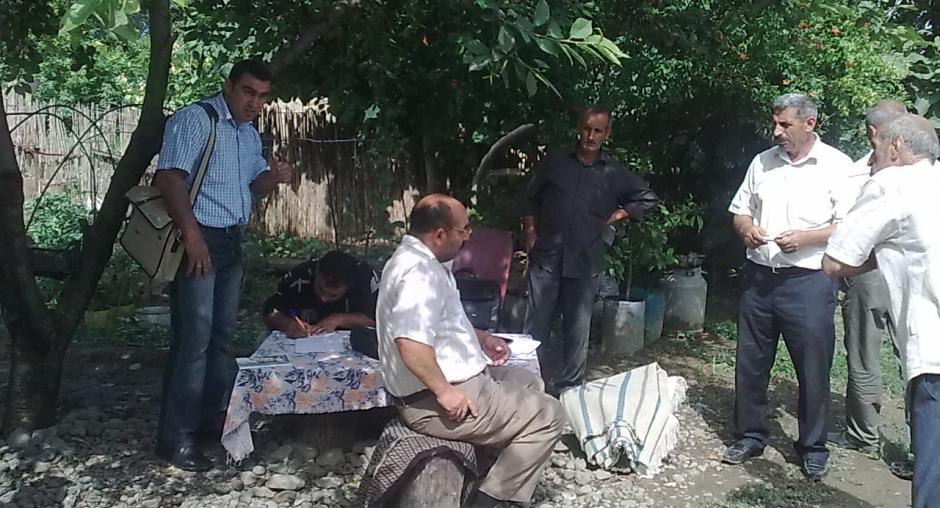Small grants, big difference: CASE helps to boost environmental security
Environmental challenges can endanger the security of nations and the well-being of their populations. Addressing them requires partnerships between government and society.
To support such partnerships, the OSCE has launched a pilot project: CASE (Civic Action for Security and Environment) aims to strengthen civil society efforts through small grants for environmental projects.
In Armenia and Azerbaijan, fifteen projects are currently being implemented with the support of CASE, which has recently also expanded to Tajikistan.
"Our experience has shown that there is a need for an innovative, transparent, and easily accessible mechanism to facilitate the involvement of civil society in the environment and security field and that has been the driving force behind CASE in opening up its doors to NGOs in three countries," says Esra Buttanri, CASE Project Manager in the Office of the Co-ordinator of OSCE Economic and Environmental Activities.
Addressing environmental degradation in Armenia
In the Armenian city of Hrazdan, CASE is supporting a project by the NGO Varvogh Astgh that, in partnership with private industries, addresses the environmental impact of industrial pollutants.
Varvogh Astgh publishes information on the environmental situation in Hrazdan, monitors pollutant emissions, and holds seminars with local industrial partners and government authorities.
"We know that the high concentration of dust in the air has significantly increased the incidence of respiratory diseases in Hrazdan. We also know that heavy metals contaminate the drinking water and agricultural produce," says Edgar Yengibaryan, Project Co-ordinator at Varvogh Astgh.
"But support from CASE allows us for the first time to assess pollution in a comprehensive way and to convey our findings to our government and industry partners, so that we can devise solutions together."
The project team has moved quickly to commission the environmental assessment. With support from the OSCE Office in Yerevan, it has successfully partnered with the Hrazdan local government, NGOs and industry representatives and will shortly hold its first seminar with a local cement producer.
Once Varvogh Astgh has established a comprehensive picture of the situation in Hrazdan, it will convene an expert group to make recommendations for mitigating the impact of the pollution and launch an information campaign. In this way the public can keep abreast of and participate in industry responses to the Hrazdan pollution problem.
Climate change mitigation in Azerbaijan
In Azerbaijan, the Economic Research Centre, an independent research institute, is implementing a project that seeks to help the country's agricultural sector adapt to climate change.
Drawing on a CASE small grant, the Centre is assessing the socio-economic impact of climate change around Ganja and Gazakh in a study and develop adaptation measures together with the government, affected farmers and agro-businesses and civil society actors.
To put its initiative on a broader basis, the Centre has sought to organize a climate change alliance among civil society organizations in Azerbaijan.
"This climate change mitigation project is a good example of how CASE encourages partnerships and networking between a wide spectrum of civil society organizations, the private sector and academia," says Melissa Stone, Deputy Head of the OSCE Office in Baku.
"This means that they can pool resources and build on their strengths and expertise to effectively address complex environment and security challenges."
In April this year, the Centre started collecting data for its impact study from government agencies and other sources. Currently, the project team is conducting interviews with farmers and agro-entrepreneurs in Gazakh and Ganja to develop adaptation measures.
Over the next few months the project team will finalize the study and recommendations and organize risk management training for agro-businesses. Based on its findings, the Centre will raise awareness on climate change and its consequences for Azerbaijan. These efforts will be supported by the Azerbaijan climate change alliance, which is currently taking shape and will be formally launched in November 2010.
Expansion to Central Asia
Encouraged by its success in the South Caucasus, CASE expanded to Tajikistan in April 2010. The institutional set-up has already been put in place and, together with the government and local civil society, the CASE team has defined the priority environmental challenges to be addressed.
In July 2010, the CASE Screening Board has started the selection process of a first batch of projects. Representatives of local and international NGOs, government and international organizations will be on the board, ensuring that only sound and locally relevant projects are selected.
"CASE proves that with small grants it is possible to achieve big outcomes," concludes Goran Svilanovic, Co-ordinator of OSCE Economic and Environmental Activities.

